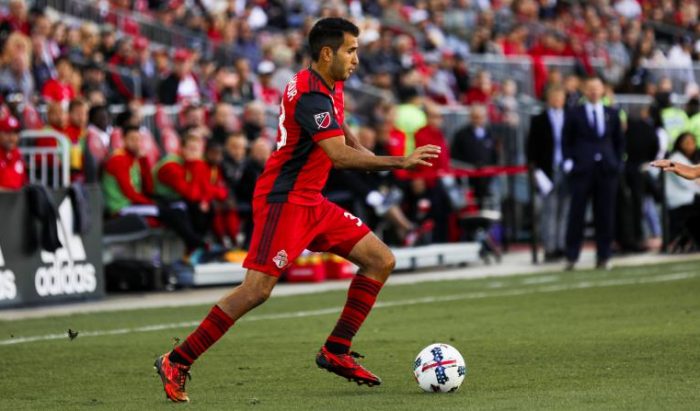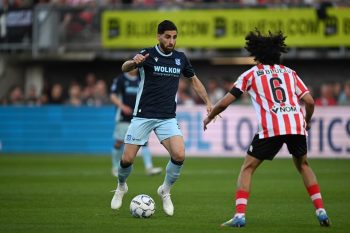Toronto FC’s Steven Beitashour a study in perseverance from start to finish

The National – TORONTO, Toronto FC fullback Steven Beitashour has had to do things the hard way ever since he took up soccer.
Finding a college that wanted him. Or an MLS team to show interest in him. Or one willing to pay what’s needed to keep him. Or a national team to commit to him.
This year was no different as Beitashour had to survive a life-threatening on-field collision, undergo pancreas surgery and then fight off competition for his job after sitting out almost two months.
The 30-year-old American-born Iran international met every challenge and likely will start Saturday in his second straight MLS Cup final against the Seattle Sounders.
If anything, Beitashour has always managed to turn a negative into a positive. For example, he tweaked his diet after this season’s trauma and lowered his (already minimal) his body fat.
“I feel good. I feel actually better … I always thought I was pretty healthy with my diet (but) there’s always room for improvement,” he said.
Words to live by for a man who knows nothing of half-measures. Beitashour always plays with the pedal to the metal. And if that means a painful collision, he won’t pull out.
That’s exactly what happened at BMO Field on June 27 in the Canadian Championship final. Beitashour was racing towards a ball by the sideline. So was Montreal Impact defender Kyle Fisher.
Beitashour got there first. Fisher arrived a second later, brutally body-checking the TFC defender to the ground. Amazingly Beitashour finished out the match but didn’t get a wink of sleep that night because he couldn’t find a position that didn’t hurt.
The next day he went in early to the Toronto training centre where team officials immediately ordered him to the emergency room. Amazingly he drove the 17.5 kilometres himself.
Every bump felt like he was “being stabbed in my stomach.” It was so bad he threw up en route.
Doctors later told him it was the kind of internal damage they typically see as a result of a car crash.
Beitashour’s first taste of Major League Soccer was as a nine-year-old ballboy with the then-San Jose Clash (now Earthquakes) in the first-ever MLS match April 6, 1996.
The San Jose native was a star soccer player at Leland High, a central attacking midfielder who led the team in goals his final two seasons.
As a high school senior, Beitashour won the inaugural Pat Tillman award given to a Bay Area student for outstanding achievements in both athletics and academics. Tillman, a defensive back who quit the career to join the U.S. Army after Sept. 11 and later died while serving in Afghanistan in 2004, attended Leland.
“He had his priorities,” said Beitashour. “And he’s said ‘That’s over, playing a game.’ (I have) so much respect for him.”
Tillman was the first Leland athlete to have his number retired. Beitashour was the second (in January 2014).
Despite a stellar high school career, Beitashour did not get many offers from big colleges. But his high school coach knew San Diego State coach Lev Kirshner and reached out to him.
Kirshner scouted Beitashour and liked what he saw. But with no scholarships available, the school could only welcome Beitashour as a walk-on, albeit a recruited one.
Knowing the Aztecs played schools in the Pac-10 (now Pac-12), Beitashour accepted.
“I had a chip on my shoulder being a walk-on. I just wanted to prove to the UCLA, Stanford, Berkeleys at least take a look at me.”
Beitashour also played club soccer with the PDL San Jose Frogs, whose roster featured several Cal-Berkeley players. They told him Cal’s coach wanted him to transfer in his sophomore year.
“I said ‘That’s funny, you should tell him to go check his emails from my senior year at high school.’ I basically said ‘I don’t need money, I want to come to your school, I want to play there. Just come check out our games.”‘
He turned down the transfer offer.
Beitashour played 57 games for San Diego State, with no goals and eight assists. He knew while his statistics might not be special, he did the right things off the ball to help his team.
“I’m usually doing a lot of the dirty work, so it doesn’t get a lot of attention,” he said.
A redshirt freshman, Beitashour was moved back to midfield and fullback (first left and then right) at San Jose State.
“Anything to help the team,” he said of the move.
His best friend’s little brother was playing for a club team that had Shea Salinas, a member of the San Jose Earthquakes, come out and train them for a day. Beitashour made sure he was there that day and found out that Mark Schrick, the club team coach, knew Earthquakes coach Frank Yallop.
So his best friend’s little brother went to his coach and asked Schrick to talk up Beitashour to Yallop. Beitashour got a call from Yallop the next day inviting him to a tryout that turned into a two-week trial.
San Jose wanted to sign him but Beitashour — who had turned down a contract with a Belgian team after a tryout because he wanted to honour his father’s wish that he get his degree — said he needed to finish his last semester of school.
The Earthquakes eventually drafted him in the second round (30th overall) of the 2010 MLS SuperDraft. San Jose had plucked now Toronto teammate Justin Morrow two picks earlier from Notre Dame.
“It was pretty remarkable,” Beitashour said. “The belief and trust of a complete, random stranger to give me an opportunity like that. My best friend’s little brother. He didn’t have to say anything to his coach … You got a little help here, you got a little help there.”
Beitashour made the most of his opportunity.
“But without their part, I couldn’t have got to my part.”
Through it all, Beitashour used being passed over to drive him on.
“I questioned it at first but one of my cousins always says ‘Never question your past because you’re here because of that path you took,”‘ said Beitashour. “He’s a wise guy. I try to listen to him. He’s someone I respect a lot.”
His first pro contract was a modest US$40,000 — a one-year deal with three options. Beitashour had turned down more in Belgium.
When the deal was up, he wanted to stay in San Jose but couldn’t agree on a contract. He had led the team in assists one year, led all defenders in assists another year and had earned all-star status and a national team call-up.
But San Jose wouldn’t budge. Vancouver, with a hole at right back after the retirement of Young-Pyo Lee, wanted him.
His salary went from $49,612 in San Jose to $177,167 in 2014 in Vancouver thanks to a two-year deal plus an option. Beitashour enjoyed Vancouver and the team did well, but the Whitecaps did not pick up his option.
Seven or eight teams came calling, including Toronto with Morrow doing his bit to sell his fellow fullback on Canada.
He had come from a team with a good defence and nor very productive offence. Toronto had the firepower up front but needed help on defence. The fit seemed right.
His salary went from $197,167 to $244,000 in 2016 with Toronto. This season he is making $264,000, sixth best on the club
Pulling on a national team jersey has always been Beitashour’s dream.
The door first opened in 2012 when he was called up to the U.S. team and was on the bench but didn’t dress for an August game again Mexico at Azteca Stadium.
Beitashour, who underwent sport hernia surgery after San Jose’s Supporters’ Shield campaign that year, was invited to the U.S. national team camp in January 2013 but had to leave because of complications due to the surgery.
“I’d been trying to get to some sort of national team camp, U-whatever all the way up to the full team, for so long and I finally got there and I had to pull myself out just because I was in so much pain. As I was for four months at the end of the 2012 season.”
After games, he felt like there was a knife in his stomach.
The U.S. coach Jurgen Klinsmann texted him after the surgery but Beitashour didn’t hear anything more.
Then Iran popped up and said “we’re still interested.”
While Beitashour was born in San Jose, both parents are from Iran. His father came over to study electrical engineering at San Francisco State where he was the soccer team’s MVP. He went back, met his wife and returned to the U.S. to work for Apple.
His mother always spoke to the family in Farsi so Beitashour understands it perfectly and speaks it well, although he says he is embarrassed by his western accent.
He made his debut in Tehran against Thailand in October 2013, with the fans chanting his name in the warmup.
“It was a lot of fun. There were so many people at the airport at four in the morning, just waiting for my arrival. That’s what really made me feel welcome, all that, all the little things,” said Beitashour. “And then the fans, the thousands of them, they said in Farsi ‘Put Beitashour in’, they kept it going for a good two, three minutes.”
Beitashour grew up idolizing Brazil because of the way it played the game. His first poster was of Brazilian striker Ronaldo. So he was doubly delighted when Iran selected him for the 2014 World Cup in Brazil. It proved to be bittersweet, however, as he did not see action.
“I’m right there, at the front door of it all, in Brazil. You couldn’t write this up any better … I’m knocking, I’m trying to get in,” he said. “But I just couldn’t get on the field. So it was tough in that sense.”
With his wife and several good friends on hand, Beitashour watched from the bench as Iran tied Nigeria, lost to Argentina and beat Bosnia and Herzegovina.
“Probably the most difficult part was getting the thousands of social media messages, like thousands, saying we can’t wait to see you play tomorrow, we can’t wait to see you play. Everything. And feeling like you let all of them down by note getting in,” he said.
So what happened?
“There is an explanation. That will come in another time or day,” he said without elaborating.
He was subsequently called up by Iran for the Asian Cup in 2015 but was unable to play because he was coming off a hamstring injury.
But he says, as far as he is concerned, the door is still open.
Now in his eighth MLS season, Beitashour has two goals and 30 assists in 192 regular-season games.
While some see Liechtenstein international Nicolas Hasler as a more attacking option for coach Greg Vanney, Beitashour has registered some important assists for Toronto.
It was Beitashour who used his left foot to deliver the cross that Benoit Cheyrou headed in to give TFC a 6-5 aggregate lead in the dying seconds of last year’s MLS Eastern Conference final.
More often than not, Beitashour is the kind of player you don’t really notice. He just does his job.
“You know what you’re going to get from him every single day,” Vanney once said of Beitashour. “He comes out and he just puts his work boots on and he plays and he competes.”
Excellent at reading the game as a defender, Beitashour will also “give you an honest day’s up and down all day long” on attack, Vanney added.
“He’s just a honest-working guy, every single day, and gives you everything he has. Those are the guys you love to have on your team.”




